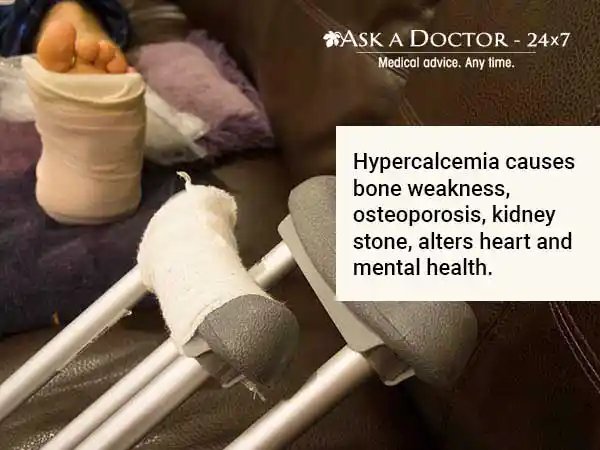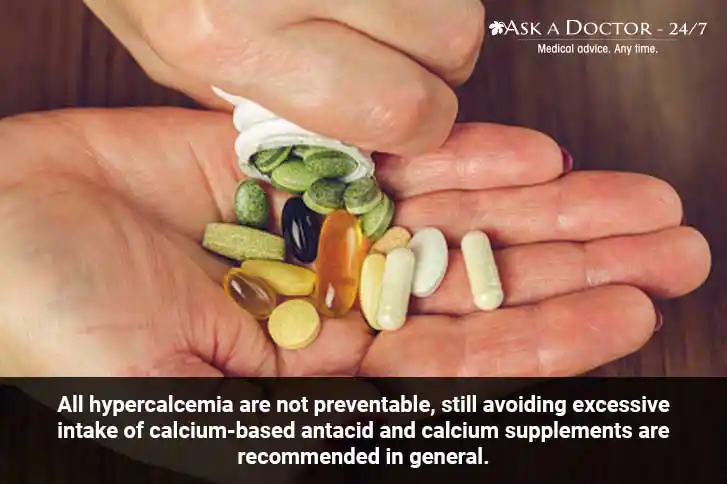Hypercalcemia: What To Do When Your Body's Calcium Level Gets Too High
We all know that calcium is essential for strong bones and teeth. This is why it is always advised to keep a regular check on our daily intake of calcium. But, did you know that as low a calcium level causes harm to your body - so does a high calcium level? You read it right! It is a proven fact that if the calcium level in your blood goes above the normal range (between 8.6 and 10.2 milligrams per deciliter (mg/dL is considered a normal range), it too may weaken your bones, cause kidney stones, alter the functioning of your heart and brain, and bring many more adverse conditions that can affect your overall health and wellbeing.
Read on to know the prime factors that cause hypercalcemia and also explore some daily health tips that can help you to stay away from this condition.
Role of hormonal imbalance in hypercalcemia

Calcium level in the blood is majorly controlled by the parathyroid glands. Parathyroid glands are four small glands present in the neck. When your body needs calcium, these glands secrete a hormone. This hormone signals the bones to release calcium into the blood and directs kidneys to activate vitamin D and increase calcium absorption from food as well as to reduce draining calcium into the urine. Therefore the most common cause of hypercalcemia observed is over-activity of the parathyroid gland. This is usually common in people aged between 50 and 60.
Other prime factors that cause too high calcium in the blood

Some other common causes of hypercalcemia are:
- Cancer, such as cancer of the lung, breast, and blood
- Excessive vitamin D, which causes the body to absorb more calcium
- Certain medications such as diuretics (water pills), lithium (used to treat mental illness)
- Certain health conditions such as Tuberculosis (TB), kidney disease, fungal infection, thyroid disease, adrenal gland disease, and milk-alkali syndrome (excessive intake of calcium such as in the form of dietary supplements or calcium-based antacids), to name a few.
How do I know if I am suffering from hypercalcemia?

A slight elevation in calcium may go unnoticed as it usually causes no symptoms. You are likely to have accumulated too much calcium in your blood if you experience the following:
- Excessive thirst and frequent urination
- Muscle weakness and pain in the bones as they become deficient and weak subsequent to losing calcium to the blood
- Confusion, mood disturbances
- High blood pressure and heart problems
- Stomach upset, nausea, and vomiting
- Kidney malfunctioning
You should not ignore the above-mentioned symptoms and should immediately seek your doctor’s advice. Your doctor may recommend some blood tests or other tests to check the calcium level in your blood and diagnose the underlying cause of hypercalcemia. To learn more about the symptoms associated with hypercalcemia and the diagnosis, consult a doctor online.
How does it affect my body and how can it be managed?

If the calcium level in your blood remains high consistently, it’s time to pay attention and see a doctor as it may adversely affect your body in many ways. Hypercalcemia can reduce your bone mass and make you prone to fractures or to osteoporosis. It may also result in the formation of kidney stones and other kidney problems. It may affect your mental health and heart health.
Treatment depends on the severity of the condition and the underlying cause. Therefore, it is important that you seek your doctor’s advice as he is best equipped to plan your treatment based on your condition. He may also choose to refer you to a specialist for further workup. Consult a doctor online for more information on complications and treatment.
Is hypercalcemia preventable? What best I can do to stay away from this condition?

Anyone can develop hypercalcemia at any stage of life and not all hypercalcemia are preventable. Still, excessive intake of calcium-based antacids and calcium supplements should be avoided in general. Other than this, make sure you do the following:
Consult your doctor if you have a family history of high calcium, parathyroid conditions, or kidney stones.
Do not take any medication, dietary supplements, vitamins, or minerals without discussing them with your doctor as some of these may either trigger or worsen the hyperglycemia
Indulge in some moderate physical activity, such as walking or yoga. Stay active to keep your bones strong and prevent them from breaking. and Make sure you drink plenty of fluids to keep your body detoxed.
For any further queries related to hypercalcemia, consult an Internal Medicine Specialist now.
Ask a Specialist
Recent Questions


